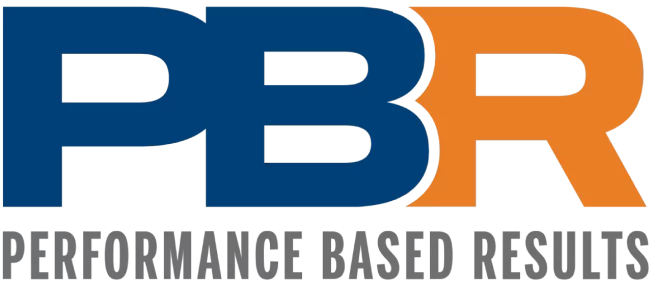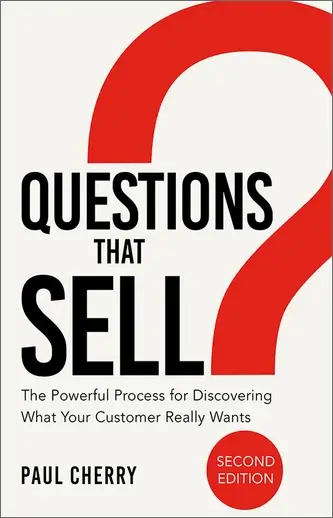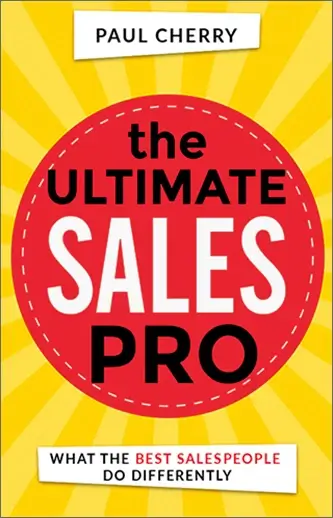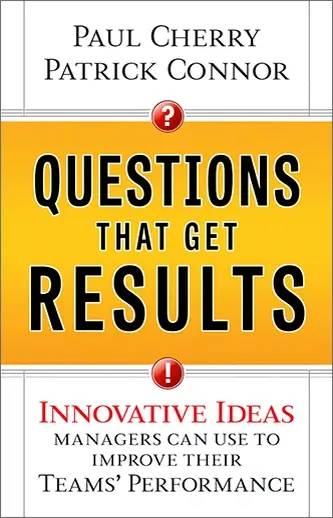I need help with improving dealer relationships. My products are sold primarily through dealers and distributors. I have a really hard time judging whether or not a dealer is going to be successful at selling my products. Half the time I am thrilled that they are willing to take on my line. We have the honeymoon period where everything seems to go well but after a few months, many of them seem to fade away on delivering results. I am willing to spend time and energy motivating them to sell more of my products, but I am not sure how I would go about that. It isn’t like I am their manager or even a member of their team.
I try to check in with all of my dealers at least once a month. Sometimes the conversations are fruitful, but often it is like trying to pull teeth to get information from them.
Sincerely,
Hoping for a Great Distributor Opportunity
Dear Hoping for a Great Distributor Opportunity,
It’s difficult to rely on dealers or distributors to sell your products. How do you know who will make a great business partner and who will be a dud? When I have coached salespeople about this in the past, I tell them when researching a potential distributor that the first step is to assess if the dealer is even a good fit. You should use the same techniques with a potential dealer that you would use if you were interviewing to hire a potential employee to work for you at your company.
Namely, it starts with asking some good, open-ended questions. Learn more about their goals and plans for the future, challenges they’re facing, strengths they possess, and where they see opportunities in the market should they consider taking on your product lines.
Three Questions — Qualify and Engage Potential Dealer Opportunities:
1. Customers have many choices today. How are you differentiating yourself from your competition?
2. What sales challenges are you facing in your market and how are you addressing them?
3. Where do you see yourself and your business three years from now? What are your plans to get there?
Asking these questions can lead to fruitful conversations about:
- How motivated is your dealer and what’s his or her aspirations?
- What makes this dealer unique or different from other dealers in their market? i.e. Is he a follower, trendsetter, a leader in the market?
- Does he or she understand how to sell value or is he or she more price-driven?
- Is the dealer’s values aligned with your values and your company?
You should be able to determine after asking these questions, if you want to move forward with this dealer relationship.
G.A.P. Questioning Technique — Improving Dealer Relationships
In the long term, you want dealers who are passionate about and planning for the future. When I coach salespeople on how to approach dealers, I teach them the 3-step questioning technique known as GAP. It stands for Goals, Actions and Problems:
GOALS
Tell me, where do you see yourself and your business three years from now?
As you continue the task of improving dealer relationships, this question identifies if your contact can think in terms of the big picture, or if he/she is only looking a few days, weeks or months ahead. If they don’t think about long-term planning, you’ll have a tough time collaborating with them. A dealer who doesn’t have a long-term plan is a dealer who should not get much of your time. These dealers too often run their business by the “seat of their pants”. They let their market, competition and customers dictate their future. Bottom line is, this individual is not a good dealer to pursue.

ACTIONS
What actions will you need to take to achieve your goals?
It’s one thing for someone to have a long-term plan, but how will he or she achieve that plan? For example, a dealer might say her goal is to double her business in three years. That’s a great answer! It tells me she is aggressive, motivated and hungry for work. But could it be lip service? Many people want to double their business and never do. In my quest for improving dealer relationships, she needs to be able to provide me with the steps she is going to take to get to her goal.
For example, here are some great action steps for her to follow:
- Hire new salespeople.
- Take on new product lines.
- Expand territory.
- Implement new marketing initiatives.
- Ramp up product and sales training.
On the other hand, if she merely says she will “just work harder,” then I have to assume she is not really serious about her goal.
PROBLEMS
What problems or roadblocks might get in your way? How will you handle them?
Every dealer faces challenges in their business. When asking this question, you’re helping the dealer recognize that on the road to success, there will be obstacles and surprises. You’re also positioning yourself as a collaborator and a trusted advisor that will help in her success. Together, you can brainstorm solutions to any possible issues or challenges that might come up. In the process of improving dealer relationships, there is incredible value in helping your dealer develop the clarity she needs to achieve her goals.
But there’s more. You want to better understand how he or she has handled similar situations in the past when taking on new product lines. What worked, what didn’t and how they overcame those hurdles to make those lines successful? The more you understand past issues, the better you’ll be able to predict future performance should they move forward taking on your lines.

Tactical vs. Strategic Dealer Relationships
Asking your distributors questions will certainly position you as a trusted collaborator in the eyes of your dealers. But is that enough to improve your relationship with them over the long term? It might be for some, but it probably won’t be for every dealer you work with. And that’s okay, because not every relationship you have with a dealer has the same value for your business. That’s why it’s important to be discriminate with whom you want to spend your time and energy with.
The relationships you have with your distributors can be divided into two categories: tactical and strategic. Tactical relationships enable your dealer and your business to make money off the goods or services you provide, but they don’t extend beyond that. That’s not to say these relationships are only short-term, because they may continue for years or even decades. The goal of perpetuating a tactical relationship with a distributor is simply to make money and nothing more, however. In other words, tactical dealers produce enough to meet expected goals. You can invest a lot more time and resources to attempt to get more out of them, but in the end you’ll most likely be disappointed. Why? They’re either set in their ways or content with what they producing. That’s fine because it frees up your time and energy to invest in strategic relationships, those who are committed to and focused on growth.
The point of a strategic relationship, on the other hand, is to enable your business and your distributor to achieve bigger goals over a longer period of time. Given the nature of strategic relationships compared to tactical ones, it’s clear that strategic relationships are more valuable to your business and more difficult to replace.
What defines a strategic relationship? A few things. For starters, they understand how to sell your products. In fact, they are passionate about selling for you. They also like you. They trust you and they get excited when you come to visit and will gladly introduce you to their customers. They make money and they see you and your organization as an integral component to them being successful and growing their dealership.

Change Your Point-of-View
Because the future success of your business is heavily dependent on you maintaining the strategic relationships you have with your distributors , it’s critical that you change the way you view these relationships. Historically, many businesses have viewed their dealers as customers. This makes sense when you think about it. Dealers buy goods and services from your business and pay for them just like customers in a grocery store select and pay for the items they need.
Even though distributors have some things in common with individual consumers, some companies view their dealers as if they were their own employees instead of customers. This is understandable, too. Your distributors represent your brand to shoppers, after all, and they’re responsible for perpetuating the positive relationship consumers have with the things you produce.
While it’s easy to see why a business may view its dealers as customers or employees, research conducted by Gallup shows you need to think of your distributors as a combination of both customers and employees if you’re trying to improve your relationships with them. More specifically, successful distributor management requires you to view your dealers as your partners.
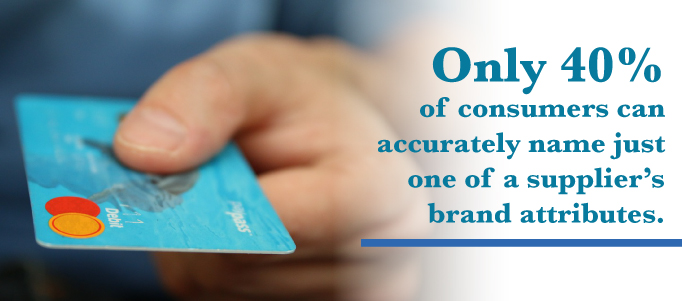
Your Distributors. Your Strategic Partners.
As a supplier, your dealers are the face of your business. They interact with your end buyers on the front lines. They recommend your products or services, instruct customers about how they can use them to make their lives better, and get feedback from shoppers about the products and services they’d like you to offer in the future. Your distributors are both your sales team as well as a resource you can tap to get invaluable information about your customer base.
Many manufacturers aim for a gross profit margin of 50 percent, meaning they hope to double their money every time one of their products or services is sold. Distributors often shoot for a gross profit margin of between 10-15 percent. What could possibly be better than increasing your profit margin or increasing your sales volume? Helping your distributors do the same.
As the face of your business, your distributors are largely responsible for how your brand is perceived by consumers. They will either communicate your company’s core values or they’ll inadvertently confuse shoppers about what your products and organization stand for. According to Gallup, only 40 percent of consumers can accurately name just one of a supplier’s brand attributes.

When you establish strategic partnerships with your dealers, they understand that their financial success is intimately tied to the performance of your goods and services in the marketplace. This makes it vital for them to deliver on your brand’s promise, which benefits your business as well as their own. It also motivates your distributors to distinguish your products or services from your competitors’ in a crowded market by communicating your brand’s positive attributes clearly, indelibly and repeatedly.
With strategic partnerships being so valuable to both your business and your distributors, you should do everything possible to better manage your dealer relationships, beginning with getting to know your distributors’ business, giving them the resources they need to improve, and helping them achieve their goals. You’ll notice that each of those things begins with asking questions or using the GAP questioning technique that was discussed earlier. You have to ask your dealers about their operations, inquire about what they need to do better and ask what their future objectives are.
Improving Dealer Relationships
If you’re serious about improving dealer relationships, you need to realize that making lasting improvements takes time. It may take a year or more to establish a strategic partnership or convert a tactical relationship into a strategic one. If you’re familiar with the adage “good things come to those who wait,” then you already know investing time in a strategic partnership with a dealer can produce results that benefit your organization, your distributor and, ultimately, the consumers who purchase your goods or services.
If you’re overwhelmed by the notion of improving your distributor relationships, you may want to begin by participating in some distribution management training. Our distribution management training can provide you with the skills you need to foster the relationships you already have in place and establish strategic relationships with new dealers down the line.
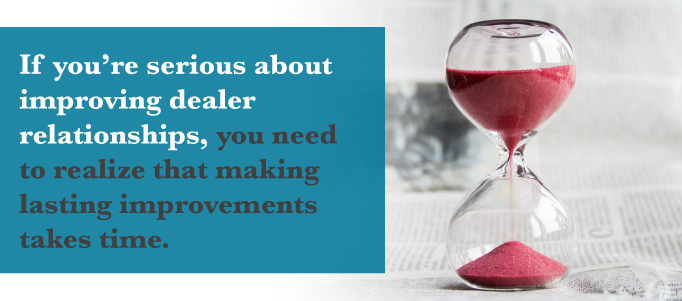
If you’re confident in your ability to improve your distributor relationships but don’t know exactly where to start, here are some tips you can use to begin the process of improving your dealer relationships as early as today:
1. Establish Trust
Who would you rather do business with: a company that delivers its products on time or an organization that only delivers 80 percent of its goods on time? If the two companies offer the identical items at the same prices, you’re probably going to do business with the former company instead of the latter because it follows through on its promises.
You can establish trust with your distributors by following through with the things your company commits to doing for your dealers, without exception. In most supplier-dealer relationships, employees from multiple levels within each organization interact with one another, so you need to make sure your company’s promises are fulfilled at every level. Bottom line is that you’ll do what you say you’ll do. However, people screw up. Customers can be forgiving, especially if you can commit to or demonstrate how you’ll avoid a similar situation moving forward. The same applies to dealers who mess up. As long as they too can come up with a game plan to prevent the mistake from happening again, the trust is there. In fact it can solidify your distributor relationship.
2. Create Face-to-Face Communication
The best way to improve the relationships you have with your distributors is to establish two-way lines of communication and use them often. When you’re getting to know how a dealer works, you should plan to be on-site so you can observe the distributor’s daily routine. You should also go into the field with the distributor’s best and worst-performing representatives so you can watch them interact with your end users.
Even after you’ve been working with a dealer for years, you should make on-site visits on a consistent basis. This will give you the chance to talk to your dealer face-to-face and it will reaffirm your commitment to the organization and the relationship your business shares with the distributor.

3. Manage Online Communication
In addition to meeting with your dealers in person, you should start an email program that includes a mix of single emails and newsletters. You can use these tools to share information about upcoming product launches, future meetings such as conferences, policy changes and how you’re addressing their needs and requests. At the end of each, you can solicit feedback and remind your distributors about all of the options they can use to contact you.
4. Present Webinars
You can also create a series of webinars for your dealers. Webinars are an effective and affordable way to maintain the two-way line of communication you need with your dealers in order to maintain your strategic partnerships with them. If you’re working with a new dealer, you can start by using a webinar to give them a video tour of your facility. If you’re trying to improve a more mature working relationship, you can create webinars for training, to share information about new products and introduce new technology.
No matter what the topic of a webinar is, be sure you provide a platform your audience can use to ask questions during your presentation and remember to always leave time for questions at the end of each webinar.
5. Create Performance Agreements
To keep the lines of communication open and proactive regarding how to communicate, how often and by when, it’s imperative to set up performance standards so you can monitor and manage expectations. You need to put on paper what you’ll do for them and what’ they’ll do for you. What you expect from them and what they can expect from you. Problems are going to surface and unless you have clear and measurable standards in place, they’ll be misunderstandings. The dealer will say, “I thought you meant, I don’t understand, I didn’t know it was important, we’re having challenges with, ….we can’t, I’m too busy….etc. “ The easiest and quickest way to resolve communication issues is to get back to what you both agreed to in writing. And if it’s not in writing, good luck trying to hold yourself and your dealer accountable for achieving results.
6. Collaborate
You should plan to host meetings with your distributors on a regular basis. You should meet them on both individual and group bases to discuss new product launches, provide updates about your policies and procedures and introduce new technology. Even more importantly, you should discuss your distributors’ needs when you meet with them. Ask your dealers about the obstacles they’re facing and what you can do to help. By developing solutions together, you increase the likelihood that your dealer will buy into them, because your distributor was involved in the process.
Earlier, we discussed how your dealers are the face of your company and how they interact with customers on the front lines. This kind of interaction enables your distributors to get feedback from your customers that you wouldn’t have access to otherwise. While you should constantly encourage your distributors to share customer feedback with you, meetings give you the chance to ask your dealers for customer feedback directly. Doing so may help you and your dealers identify opportunities for you to change your current products or services and develop new ones.
Depending on a variety of factors, including the size of the market that uses your goods or services, your distributors may have relationships with other companies who compete in your market niche. If this is the case for your dealers, having a strategic relationship with your distributors instead of a tactical one can be the difference between the dealer selling your products or those produced by one of your competitors.

In addition, having strategic relationships gives you the chance to ask your distributors for suggestions about how you can improve based on what they’ve seen your successful competitors do. Your distributors will have a vested interest in sharing this kind of information in most cases, because their success is directly dependent on yours.
7. Host Social Gatherings
Just as you should schedule business meetings with your distributors on a regular basis, you should also plan to host some social functions. Many people don’t behave the same way in business environments as they do in less formal situations. They also may not be as forthcoming with information in a business meeting where they’d have to speak in front of a group of people as they would be in a one-on-one interaction.
When you host a social function for your dealers, you give them the chance to “let their hair down” and share information that can help you improve your operations and, more importantly, deepen the relationship you share with your distributor.
8. Make a Distributor Portal
To show your dealers how committed you are to their success, you should give them access to the information they need 24/7 by making a portal that’s exclusively for them. The portal should be the one-stop shop your dealers need to get your sales collateral, view your past webinars and access your pricing and training materials. Your portal should also include a secure page your distributors can use to provide feedback any time of day.
9. Create Employee Engagement
While you can’t control your distributors’ management style, you can share some best practices that can help them create employee engagement. When employees are engaged in their work, it creates benefits that can help your dealers increase their gross profit margin as well as their revenue, including greater employee productivity (21 percent), better customer metrics (10 percent), less shrinkage (-28 percent) and reduced employee turnover (-65 percent).
Remember: your dealers are the face of your brand when it comes down to your end users’ perception of your company and its products or services. This makes it critical that you help your distributors attract the right kind of talent and retain the best salespeople to represent your brand. Helping your dealers do these things will deepen the strategic relationships you have with them.
In fact the best dealer relationships are the ones whose values are similar to yours. Help them create a good culture that reflects the one you have.
10. Share “Gain” & “Pain”
In order to maintain healthy strategic relationships with your dealers, you have to be willing to stand by them in good times and bad. If you come across a potentially lucrative opportunity, involve your dealers so they can benefit from it right along with you. Similarly, if times are tough, don’t prop up your bottom line by charging your strategic partners more for the goods and services they normally buy from you.
Keep your prices competitive to help your distributors continue to succeed, which in turn will help your business survive challenging economic times. It will also go a long way toward your goal of improving dealer relationships.
11. Provide Support
Depending on your industry, you may rely heavily on your distributors to make repairs to your products or you may handle the necessary repairs yourself. If your dealers are responsible for maintaining the functionality of your products on behalf of your end users, make sure you provide the support they need to make any required repairs.
Even if your dealers don’t fix mechanical problems, it’s likely they’ll want you to provide support in other areas. In addition to providing training about new products or services, you should be willing and able to provide support in certain key areas, such as forecasting, information systems, marketing and business planning, among others, whenever a dealer requests help.
While you might fear your distributors will consider this kind of support to be “over the top,” don’t. Many companies want to work with suppliers that are willing to help them in any way possible, especially in areas where they’re weak. By offering support with key business functions, you’re simply fulfilling your promise to help your dealers be successful in every way.
12. Offer Product Sales Training
Educate the dealers sales and sales leadership not just on your products but on how to sell the products. Don’t be skittish or assume that you can’t teach the dealer reps how to sell your products, assuming they already bring a ton of experience and/or customer relationships to the table. Very few dealers provide any structured sales training for their sales people. Fill that void. If you’re uncomfortable running a group session, coach dealer reps one-on-one. Many reps are hungry to learn, especially on how to sell more, earn more and close more.
13. Develop Advertising, Marketing and Lead Generation Plans
Put together a plan on how you are going to support your dealers. Feed them leads but go beyond that and help them generate marketing leads through advertising in regional trade publications, journals and newspapers, direct mail and on-line.
14. Participate in Face-to-Face Visits with Their Customers
When you visit your dealers, go out on joint sales calls and visit their most promising customers. It shows respect and appreciation to have someone from corporate take the time to visit the end user. Plus you are another set of eyes and ears to learn about the customers’ needs in order to reinforce the relationship and your value to close more business.
15. Encourage Open-House Demonstrations
Encourage your dealers to have open houses where they invite their customers to the dealership so you can join in on product demonstrations, educational seminars and promotional giveaways. This is a great way to meet many end-users in one location and help the dealership generate more sales opportunities.

Mistakes to Avoid in Distributor Management
Now that you know some of the things you can do to improve the way you manage your dealers, let’s look at some common mistakes that often get in the way of suppliers establishing strategic partnerships with their distributors. Some of the most common mistakes are:
MISTAKE ONE:
Not Being Familiar with Your Dealers’ Business
If you’re like most suppliers, your profit margin is probably around 50 percent while your dealer’s gross profit margin is closer to 10-15 percent. This difference in gross profit margin underscores the differences that exist between your business and your dealers’. While you may be focused on production, distribution is more a business of margins. This sometimes causes dealers to focus on selling the products and services that have the greatest return instead of items that have lower profit margins. If that’s the case with your distributors, what happens if your goods or services don’t yield the highest profit margin? To create a strategic partnership with a dealer, you have to understand their business and their objectives. You need to define your role and your distributor’s role in the relationship as well as each of your responsibilities. This will enable you to identify things you can do to increase the profit margin your goods or services produce for your distributors, making it more likely that they’ll actively sell them. This will also prevent the potentially costly problems that often become apparent when a business has unrealistic expectations for its partners.
MISTAKE TWO:
Not Setting Quantifiable Performance Goals
In order for your distributors to meet or exceed your expectations, they need to know what they are. You need to make sure your dealers know what is expected of them by providing quantifiable performance goals. You should work with each of your distributors to set measurable sales goals in which you both agree. Make sure your dealers understand the benchmarks they’re expected to reach and monitor their performance throughout the year. Having metrics you can use to evaluate your distributors will give you the chance to take corrective action early if any of your dealers are struggling to perform. It also gives you the opportunity to praise dealers who are surpassing the goals you set for them, which can keep them motivated even when things slow down.
MISTAKE THREE:
Not Motivating Your Distributors to Sell Your Goods or Services
Unless your products or services are staples that consumers simply need to survive, your dealers are probably going to have to actively sell them. Whether your distributors sell a handful of specialty items or they sell hundreds of products and services, it’s your job to motivate them to sell your things. The way you should do this is by following the tips provided earlier to create a strategic partnership that will increase your dealers’ dedication to your business. When your distributors see that their success is directly related to your own, it motivates them to sell more of your products and services.
MISTAKE FOUR:
Not Communicating Regularly
When it comes to cementing the relationships you have with your dealers, communication is the key. Honest, ongoing communication can help you avoid unnecessary and counterproductive conflicts in your distribution channel. Regular communication can do more than prevent conflict. It can also ensure that your efforts and your dealers’ efforts are aligned and similarly focused.
A continuing two-way conversation with your distributors is the basis for developing common values and goals, providing reciprocal support and improving end-user satisfaction as well. Communicating regularly with your dealers will help selling your products or services to remain the focus of your distributors’ business activities, too.
Do you think the tips provided here will help you improve your dealership relationship management techniques? Do you have additional ideas that can help suppliers improve their distributor management? We invite you to share your thoughts in the comments section now.
If you’re interested in improving your team skill set on sales for distributors, contact us.
